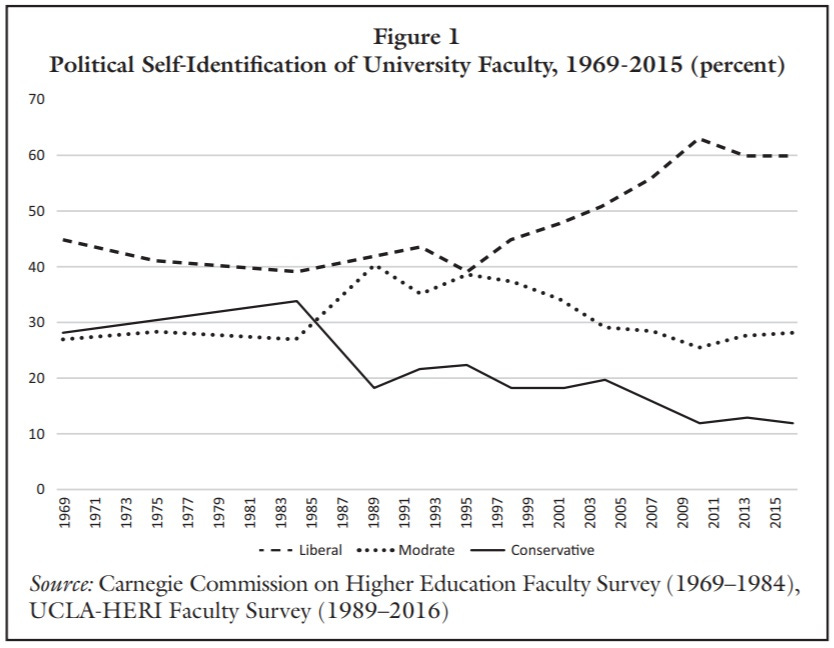Are Universities Biased to the Left?
Using Critical Theory to Explain the Left's Blindness to Academic Oppression
Seth Clark Silberman, who self-describes as a “Lefty PhD-holding cosmopolitan photographer and writer in NYC who was the first junior faculty hired by Yale University to teach LGBTQ Studies,” observed on X that “academia is an EXTREMELY CONSERVATIVE INSTITUTION. Anyone claiming that it’s some radical Left thing has zero experience with it.”
I find this fascinating, as there is plenty of empirical evidence confirming that, in fact, the academy, across faculty and administrators, and especially in particular departments, is dominated by the left and far left. For instance, Magness and Waugh, in an article published in The Independent Review, use the Carnegie Commission on Higher Education Faculty Survey and the UCLA-HERI Faculty Survey to show the trends from 1969 to 2015:
Looking at the evidence for specific fields, they find that English, Social Science, Fine Arts, Humanities, History, Political Science, and even Biological Sciences are dominated by liberal faculty.
How could someone in the academy not realize they were a member of a dominant group in the academy controlling the academic means of production? In a working paper, “A Critical Analysis of the Academy,” Gabriel Benzecry and I address this. We use the left’s favored lens of postmodern critical theory to examine the left itself.
Using critical theory, we argue that non-neoliberals (the left) increasingly dominates universities. This gives the faculty and administrators on the left the leverage to impose their ideological prejudice through the control of the academic means of production. Furthermore, they use their control of the academy, including admissions, hiring, promotion, and the curriculum, to socialize themselves and new members of the left to maintain and expand their authority over neoliberals (the right) in the academy.
Faculty and administrators use the term “neoliberal” itself as a binary term to degrade and “other” scholars who deviate, even the slightest, from their progressive postmodern ideological standards. This creates a chilling effect on open inquiry and teaching, discouraging engagement or critical thinking. Other forms of “othering” employed by the left against neoliberal scholars include questioning neoliberal intelligence and falsely associating neoliberalism with racism.
We then use intersectionality theory to analyze how women, Blacks, Jews, LGBTQ+, and other intersectional neoliberal intellectuals often encounter unique forms of discrimination. The lived experience of scholars like Thomas Sowell, Glenn Loury, and Walter Williams attests to the unique forms of discrimination that Black neoliberal scholars face, for instance.
We argue, using standpoint theory, that non-neoliberal professors and administrators are blind to neoliberal oppression due to their institutional academic privilege. From the paper:
“The standpoint position of non-neoliberal scholars makes them blind to the system of epistemic and pedagogical violence that sustains and expands their power over neoliberal scholars. One of the gravest harms of the system, in invalidating neoliberals, is that non-neoliberal hegemony of the academy conceals the very harm it inflicts due to its success in achieving pervasive power. Non-neoliberals are socialized through language, custom, and training into this position of privilege. Non-neoliberals are thus oftentimes ignorant of the ideological, linguistic, and pedagogical oppression that perpetuates the system that benefits them at the expense of neoliberal scholars. They have been epistemically spoiled by the system of privilege and thus. have been trained to openly engage in epistemic biases and to reject epistemic humility, since they have been socialized into a sense of superiority over neoliberals. This privilege prevents non-neoliberal scholars from knowing the lived experience of neoliberal scholars. They cannot possibly fathom the experiences of oppressed neoliberal scholars due to their membership in the oppressing class.”
In the paper, we argue that postmodern critical theory would recommend the decolonization of the academy to restore reparative justice to neoliberals in the academy through affirmative action for neoliberals and the establishment of mandatory neoliberal discrimination training programs for faculty, administrators, and students.
Please download (free with an account) and read the paper here: https://papers.ssrn.com/sol3/papers.cfm?abstract_id=4803139


